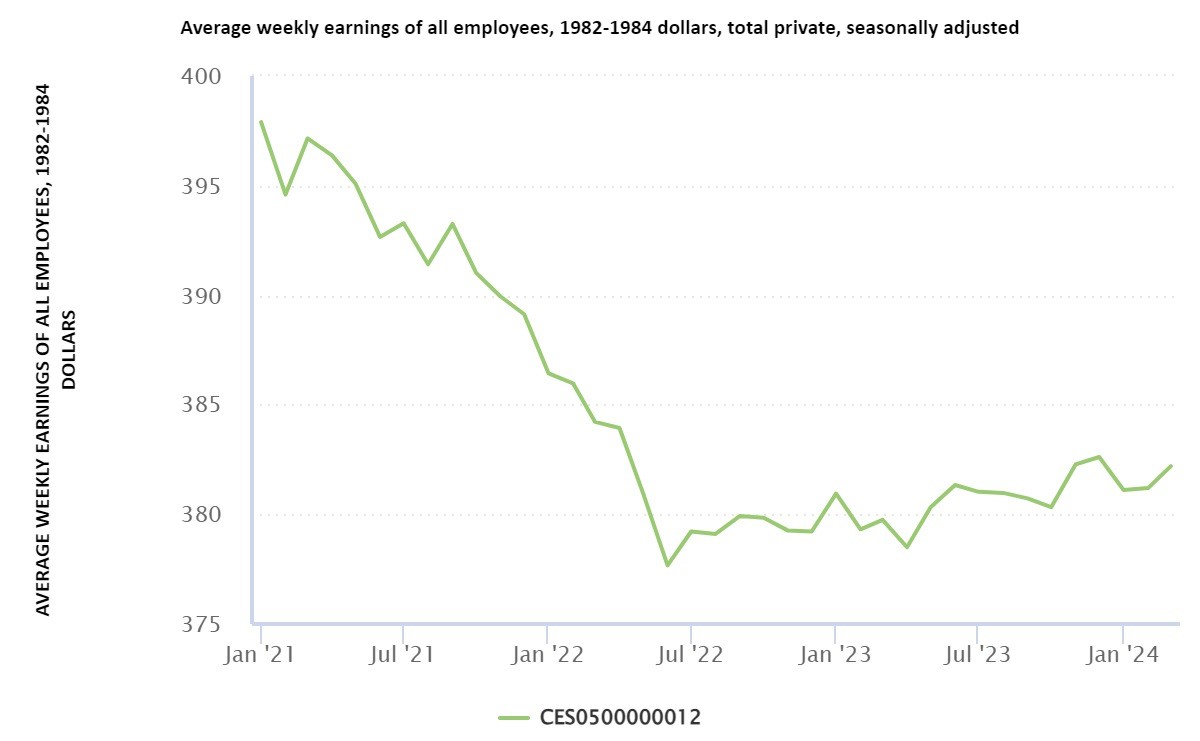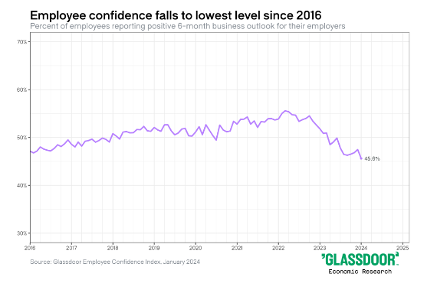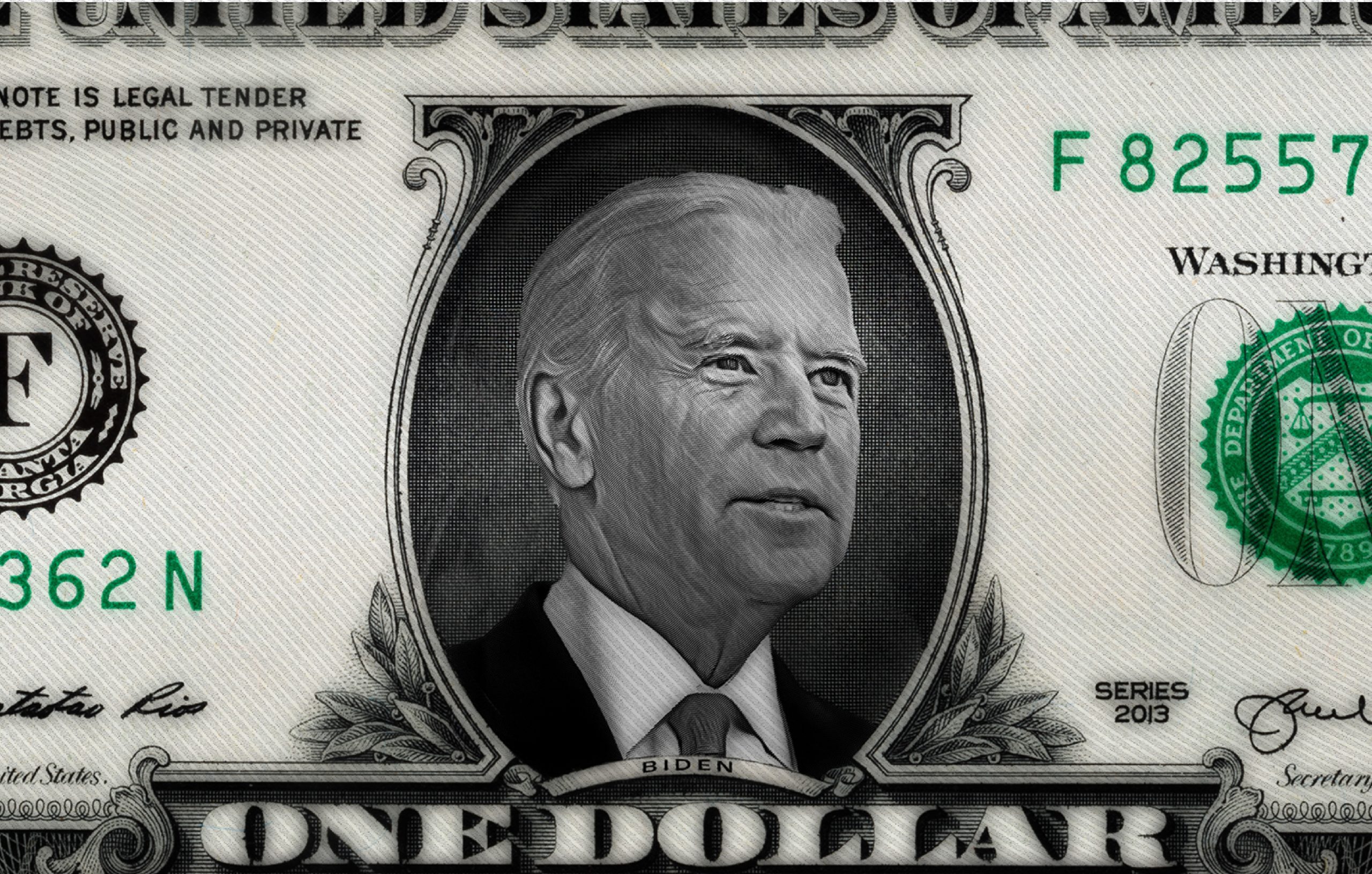Let’s start with this simple fact: Working Americans are making less than when Joe Biden took office, thanks to Bidenomics.
The Wages of Bidenomics
Over that time, inflation-adjusted hourly wages have declined by 2.5% – that’s three straight years of falling behind financially. Joe Biden likes to brag about some recent upticks in real wages, but don’t let that fool you. Those increases have been more than offset by a decrease in the average work week. The result? Since January 2021, real weekly earnings have shrunk 4.1%. American paychecks are light as air thanks to Bidenomics.

And while the President brags about building an economy “from the middle out,” American workers aren’t feeling it. In fact, they are in a funk.
Job openings have come down from 12 million in March of 2022 to 9 million at the end of last year. A survey of U.S. workers by MyPerfectResume found “85% are worried they’ll lose their jobs in 2024.” The Glassdoor Employee Confidence Index fell to 45.6% in January 2024, “the lowest level since our data began in 2016.”

Layoffs Accelerating
The anxiety is perfectly understandable. Americans see the raft of recent layoff announcements and wonder, “Am I next?” They very well could be.
Recent Major Company Layoffs
1. Charles Schwab: 5%-6% of workforce
2. CISCO: 5% of workforce
3. Citigroup: 10% of workforce
4. eBay: 9% of workforce
5. Estée Lauder: 5% of workforce
6. Hasbro: 20% of workforce
7. LA Times: 20% of newsroom
8. Levi’s: 15% of workforce
9. Nike: 2% of workforce
10. Paramount: 3% of workforce
11. Paypal: 9% of workforce
12. Pixar: up to 20% this year
13. Rivian: 10% of workforce
14. Roomba: 31% of workforce
15. Snap: 10% of workforce
16. Spotify: 17% of workforce
17. Toast: 10% of workforce
18. Twitch: 35% of workforce
19. UPS: 2.5% of workforce
20. Warner Music: 10% of workforce
21. Wayfair: 13% of workforce
22. Xerox: 15% of workforce
Bidenomics Erects Barriers to Work
The President likes to say he’s on the side of the working man and woman (but usually only if they are in a union), but workers see a government more interested in rewarding wealthy Californians who want to drive electric cars than those who want to drive a truck for a living.
Take the Biden Labor Department’s contractor rule that jeopardizes the independent status, and even the careers, of tens of millions of Americans – including truckers. Ostensibly meant to “help employers and workers determine whether a worker is an employee or an independent contractor,” the rule would make it harder for individuals to earn income as a self-employed worker. In short, it would move more employees onto company payrolls with all the potential pitfalls that entail – less income or a loss of work altogether for the contractor, businesses forgoing services because hiring someone full-time isn’t feasible, or current contract workers leaving the workforce because fulltime work isn’t flexible enough.
Bye-bye personal freedom; hello 9-to-5.
American Trucking Associations President and CEO Chris Spear rightly blasted the decision:
“I can think of nothing more un-American than for the government to extinguish the freedom of individuals to choose work arrangements that suit their needs and fulfill their ambitions. More than 350,000 truckers choose to work as independent contractors because of the economic opportunity it creates and the flexibility it provides, enabling them to run their own business and choose their own hours and routes.”
But it’s not just truckers who would be hurt, but also gig economy workers, freelancer writers, self-employed entrepreneurs, and workers in diverse professions such as optometrists, construction workers, yoga instructors, photographers, lawyers, health care providers, entertainers, drivers, and hair stylists to name just a few. Bidenomics means fewer choices to earn a living how you want.
But wait, there’s more.
The Biden National Labor Relations Board wants to classify franchise workers as employees not just of the franchise owner – who pays their salary – but of an additional larger company. This would hurt workers at the hundreds of thousands of American franchises such as restaurants or anyone who hires other businesses to perform certain services, such as janitorial, lawn maintenance, or a delivery. It would make companies like McDonalds, Wawa, or Chick-fil-A – where so many Americans get their first taste of work – responsible for what goes on in a workplace that it does not control concerning employees that work directly for the franchisee.
With union membership at an all-time low, it’s no surprise unions are big supporters of both these rules because they believe it will force more workers to join their ranks. Bidenomics is not about expanding opportunity for workers; it’s about expanding union power and government control over workers and employers.
